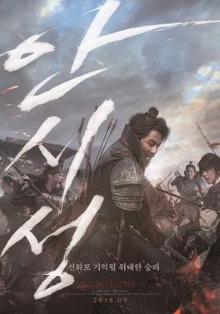Given that these historical epics seem to do well at the South Korean box office, it’s no wonder that they keep making them. This one is about the invasion of the Goguryeo kingdom by the Tang Dynasty in the 7th century and is rather cool if you like siege battles as the whole thing is one long extended siege. It goes too far in hyping up the exploits of the heroic commander Yang Manchun but does boast rather decent action movies and more interestingly, doesn’t go overboard on the nationalism.
Emperor Taizong of the Tang Dynasty invades the kingdom of Goguryeo and easily defeats the defending army led by General Yeon Gaesomun. Sa-mul, a cadet officer, is one of the few survivors of the Goguryeo army and happens to a native of the city of Ansi. They realize that the Tang army will head to Ansi next but Yeon considers the commander leading the forces there, Yang Manchun, to be traitor as they did not contribute any forces to the defensive army and that Ansi’s fall is inevitable. Therefore he orders Sa-mul to infiltrate Ansi and assassinate Yang. When he arrives, Sa-mul soon realizes that he isn’t the only soldier sent on the same mission but the others are quickly identified and killed. As he bides his time waiting for an opportunities, he sees that Yang is beloved by the people of Ansi and his officers are absolutely loyal. Furthermore, when the Tang army arrives and launches its attack, he is shocked that despite being far outnumbered, the defenders manage to repel the invaders, setting the stage for a protracted siege.
This synopsis is a little misleading because although the film introduces Sa-mul as the initial point of view character, once he meets Commader Yang, this is basically Yang’s show all the way. For the most part, the action here falls a little short of outright superheroics as Yang’s officers are all shown as being courageous and skilled but not superhuman. The exception is Yang himself with his archery feats and it gets tiresome how the film insists that he, personally, must be the hero who gets to beat back every assault wave. The subplots about Sa-mul’s divided loyalty or the romance involving Yang’s sister and one of his officers are okay but not really emotionally engaging. The big draw here is the siege itself as the Tang forces attempt to breach the fortress walls in many different ways and Yang keeps having an answer to each tactic. Trebuchets, battering rams, siege towers and more all make their appearance. The defenders in turn make the most of the defensive walls which seem to be built onto a hill and so cannot be toppled and are curved inwards so that the soldiers on top can mass attacks from multiple sides onto the center. In the end, Taizong orders the construction of a massive mound of earth to overlook the fortress walls and that is quite a sight. For all these reasons, this makes for a very satisfying historical battle movie.
While it’s understandable that this film makes numerous simplifications, I was still frustrated by the lack of historical context, especially given that this is set in a period I know little about. We do learn that the kingdom of Goguryeo is being led by a general and not a king, and Yang later says that General Yeon actually killed the king, but that’s about all that we get. We don’t get to know that the Goguryeo is one of three kingdoms in the Korean Peninsula at this time, and the Tang was allied with the more southern kingdom of Silla. But I suppose that this is also why this film feels less nationalistic as Goguryeo isn’t exactly modern Korea. Furthermore this film seems to treat Yeon harshly but he did succeed in defending Goguryeo. Taizong’s son Gaozong continued trying to invade after his father’s death and only succeeded after Yeon died. By contrast, nothing is known about the commander of Ansi Fortress and even the name Yang Manchun is a fake placeholder made up by later historians.
On the whole this is a fine historical epic that works well as an action movie. The fighting looks good, the characters are cool and the CGI is serviceable though I would prefer it if they toned it down a little. They tried way too hard to show how huge and intimidating the Tang army is. Finally, I am amused that the film shows the Tang characters speaking Mandarin but as they are all Korean actors who are clearly only memorizing the lines without knowing the language, the Mandarin is all but indecipherable. It reminds me of Hollywood employing Chinese Americans who just butcher their lines trying to speak Mandarin.
